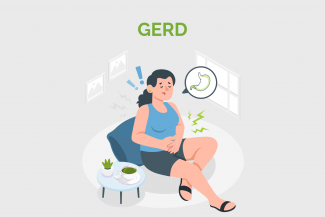Gastroesophageal Reflux Disease (GERD) is a digestive disorder.
Gastroesophageal refers to the stomach and esophagus (food pipe). Reflux means to flow back or return. Gastroesophageal reflux is a condition in which the contents of the stomach (in liquid form) backs up or refluxes into the esophagus.

In addition to medication to manage GERD, lifestyle changes are an important element of managing the condition:
- Lose weight. Obesity is the leading cause of GERD. Extra stomach fat places pressure on your abdomen, pushing gastric juices up into your esophagus.
- Avoid foods known to cause reflux. If you're at risk for GERD, avoid:
- Fatty foods
- Spicy foods
- Acidic foods, like tomatoes and citrus
- Mint
- Chocolate
- Onions
- Coffee or any caffeinated beverage
- Carbonated beverages
- Eat smaller meals. Large meals fill the stomach and put pressure on the lower esophageal sphincter, making reflux and GERD more likely.
- Don't lie down after eating. Wait at least three hours before you lie down after a meal. Gravity normally helps keep acid reflux from developing. When you eat a meal and then stretch out for a nap, you're taking gravity out of the equation. As a result, acid more easily presses against the lower esophageal sphincter and flows into the esophagus.
- Elevate your bed. Raising the head of your bed six to eight inches can help gravity keep gastric acid down in your stomach. You could also use a wedge-shaped support. Don't use extra pillows, as they only raise your head and will not help with GERD. You need your entire upper body elevated to get relief.
- Routine exercises can be carried out for weight management.
- Review your medications. There are a number of medications that can increase your risk of GERD, either by relaxing the lower esophageal sphincter, interfering with the digestive process, or further irritating an already inflamed esophagus. These medications include:
- Non-steroidal anti-inflammatory drugs, or NSAIDs
- Calcium channel blockers (often used to treat high blood pressure)
- Certain asthma medications, including beta-agonists like albuterol
- Anticholinergics, medications used to treat conditions such as seasonal allergies and glaucoma
- Bisphosphonates, used to boost bone density
- Sedatives and painkillers
- Some antibiotics
- Potassium
- Iron tablets
- If you are taking any of these medications, talk to your doctor about switching to another drug that does not have the same effect on the upper digestive tract. However, never stop taking a prescribed medication without first consulting your doctor.
- Stop smoking.
- Cut back on alcohol. As with smoking, alcohol can cause the lower esophageal sphincter to relax. Alcohol can also cause the esophageal muscles to spasm.
- Wear loose-fitting clothes. Do not wear tight clothing or belts that can constrict your stomach.
Your support team: Whom to consult
Your health care team may include:
- Gastroenterologist - doctors who treat problems related to the digestive system
- Nutritionist - Nutritionists are specially trained to help people maintain a healthy diet
- Psychologists – for emotional support
Suggested reading:
http://www.patientsengage.com/healthy-living/control-acid-reflux-these-foods
Changed
14/Aug/2017
Condition












